Robots Aren’t Coming for Our Jobs, Just Yet
In the latest issue of Wired, the article Better than Human predicts that remarkably intelligent robots are poised to wheel, scamper, or perhaps hover into your workplace and wrestle the keyboard or pen from your puny and incompetent humanoid hand. That’s right, the machines have figured out how to do your job and they’re tired of you messing it up. It’s an entertaining read, and there are some threads of logic to be found, but it’s mostly unrestrained futurism.

The article argues that robotics and AI have reached an “inflection point” that will rapidly change the usefulness of machines, setting them on course to take over every job that is currently done by a human by the end of this century. But, in a neat and reassuring twist of logic—based, evidently, on the lesson of the Industrial Revolution—the piece also concludes that this technological revolution will create just as many new jobs as it destroys. So there’s no need to cancel your magazine subscription and head for the hills with a shotgun. We and our robot coworkers will live happily ever after, it seems.
It’s true that robots are gradually moving into new areas of manufacturing, but this isn’t due to some sudden advance in AI—it’s more about the industry adopting new ways of thinking about how robots and humans can work more safely, and productively, together. This is clear if you take a closer look at Rethink Robotics’ Baxter, one of the robots highlighted in the piece, and in a story we ran in September (see “This Robot Could Transform Manufacturing”), and if you look at the broader trend across the industrial robotics industry (see “Meet the Other Robots Set to Invade Manufacturing”).
The other part of the story, about how advancing technology will create as many jobs as it takes away—and better jobs at that—is also far from convincing. It’s hard to argue about changes that might be wrought by technology over the course of the next century. But there’s also little reason to assume that the next hundred years will follow the same path as the previous hundred.
Last year, in fact, two MIT Sloan Business school researchers, Andrew McAfee and Erik Brynjolfsson, published an e-book called Race against the Machine, in which they argue that recent technological changes, primarily in information technology, have begun transforming labor in some disturbing ways. These advances have coincided with jobs disappearing more quickly than new ones are created, they wrote, adding that a similar shift could happen elsewhere as robot technology improves (see “Tectonic Shifts in Employment” and “When Robots Do Your Job”).
We’ve yet to see any evidence of this shift in robotics, though. A little over a year ago, the International Federation of Robotics published a report showing that the rapid growth in the use of industrial robots over the past 50 years has coincided with no overall decrease in employment in most countries.
I’m not betting against a robotic uprising—or robotic labor unrest—in the next hundred years. But I’m not about to start planning for robotic utopia either.
Keep Reading
Most Popular
Large language models can do jaw-dropping things. But nobody knows exactly why.
And that's a problem. Figuring it out is one of the biggest scientific puzzles of our time and a crucial step towards controlling more powerful future models.
How scientists traced a mysterious covid case back to six toilets
When wastewater surveillance turns into a hunt for a single infected individual, the ethics get tricky.
The problem with plug-in hybrids? Their drivers.
Plug-in hybrids are often sold as a transition to EVs, but new data from Europe shows we’re still underestimating the emissions they produce.
Stay connected
Get the latest updates from
MIT Technology Review
Discover special offers, top stories, upcoming events, and more.